Iran Releases Spanish Football Fan Detained On Journey To World Cup
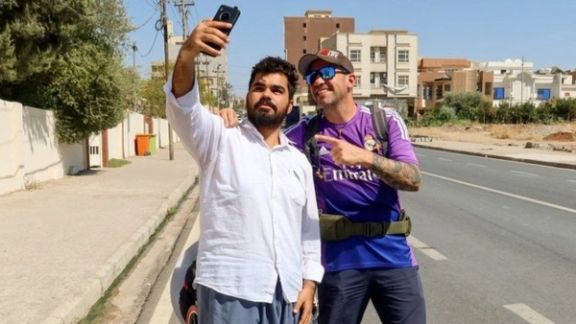
Iran’s embassy in Spain confirmed the release of Santiago Sánchez, a Spanish football fan held on espionage charges during his trip from Madrid to Qatar's World Cup.

Iran’s embassy in Spain confirmed the release of Santiago Sánchez, a Spanish football fan held on espionage charges during his trip from Madrid to Qatar's World Cup.
Sánchez had been detained in Tehran amidst an extensive Middle East tour on his way to Qatar but is understood to have been arrested after visiting the grave of Mahsa Amini, the symbol of the 2022 uprising who died in morality police custody.
Before his unexplained disappearance in October 2022, Sánchez, a former paratrooper and devoted Real Madrid supporter, documented each leg of his extensive journey on social media. Starting his expedition in January 2022, he traversed Europe, Turkey, and Iraq before facing over a year of detention in Iran.
“The embassy of the Islamic Republic of Iran is pleased to announce the release of Santiago Sanchez Cogedor, the only Spanish citizen detained in Iran,” the Iranian Embassy in Spain posted on social media. “His release comes amid friendly and historic relations between the two countries and in accordance with the law.”
Tehran is known to be holding over 10 Western nationals, with accusations from governments and NGOs suggesting that Iran is employing them as leverage in negotiations involving its own citizens.
The release was a "humane and legal" step, Iran's Foreign Ministry spokesperson said on Monday, without giving further details.

Iranian women's national soccer team player, and Emory University team member Melika Mohammadi, tragically died in a car accident last week, while visiting Iran.
On Sunday, she was commemorated at Tehran's Azadi Stadium before her repatriation to the United States for burial.
Born in the southern Iranians city of Shiraz in 2000, Mohammadi died on December 24 at the age of 23 in a car accident near the city of Bam in eastern Iran where she played for the city’s Khatoon FC, the winner of the 2022-2013 Iranian league title.
“Melika was also a women’s right activist and large empowering force to younger generations,” her teammates at Emory women’s soccer team for which she played for two years wrote on Instagram.
Female fans of Esteghlal FC honoring the memory of Mohammadi at a match in Tehran on December 30.
“She really wanted to empower other women in Iran and had plans for setting up several soccer schools in Iran with her own money to help other girls whose training opportunities are very limited,” a family member told Iran International.
The memorial during which Mohammadi’s flag-draped coffin was carried by military guards was attended by Mohammadi’s parents and other family members, friends, some sports officials, and several athletes.
Mohammadi’s sister, Aida who was wearing her sister’s number 18 national team shirt, and several others, ran a victory round at the stadium Sunday in her honor.
This was the first time such a ceremony was being held for a female athlete at Azadi Stadium. As a woman, Mohammadi had never practiced or played there due to an unwritten ban.
Women have not even been allowed to watch men’s matches at Azadi and other stadiums for four decades, except in a few rare cases, due to the ban. The world’s soccer authority (FIFA) has tried to convince the Islamic Republic for nearly a decade to lift the ban on women attending stadiums to watch male players. In recent months the ban has been relaxed somewhat.
Women’s matches are also never shown on TV.
Mohammadi’s coffin being carried at Azadi Stadium
Mohammadi started playing soccer from a very young age. She was invited to play for the national girls’ soccer team at the age of eleven and later to the under-17 team and the national women’s team.
Most recently, Mohammadi played as a midfielder for the national women’s soccer team. She played a pivotal role in her team in the 2022 AFC Women’s Asia Cup, the first ever win in the games for Iran's women’s team.
Since the age of 13, when she moved to the United States with her family, Mohammadi had also simultaneously played for Walt Whitman High School in Bethesda, Maryland as well as Emory University of Atlanta, Georgia, from where she received her Bachelor of Science in anthropology and human biology.

To be able to play for the national team in Iran and study in the US, she had to travel back and forth between Iran and the United States throughout these years.
Her mother said in a speech at the memorial ceremony at Hafezieh Stadium of Shiraz that her daughter decided to play in the Iranian league and the national team to help “shatter the glass ceiling” keeping Iranian women from success.
In the past few days Mohammadi has been remembered by fans with posters, silence, and chants at several matches.
Video posted by former national team coach, Maryam Irandoust, shows Melika and her teammates singing on a train during a tour.
“Iranian women who do not have a share of Azadi Stadium are only given their right of presence there after they die, ... Melika Mohammadi is truly commemorated only when women can freely be [allowed] presence at Azadi,” one of the tweets about the event read.
“Alas that Melika came to Azadi Stadium, for the first and last time, in these circumstances,” the very popular former TV football commentator and producer Adel Ferdosipour, who attended the ceremony at Azadi Stadium, told reporters referring to the unwritten ban on women’s team practicing and playing at the stadium like men’s team.
“Melika darling, you were the reason … Iranian female soccer players could go Azadi Stadium, a stadium where they had never trained there even once,” Hajar Dabbaghi, another national soccer team player wrote on Instagram while criticizing male soccer players for failing to show up at Melika’s remembrance.
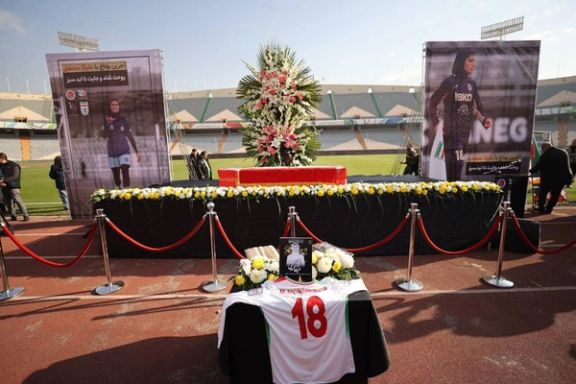
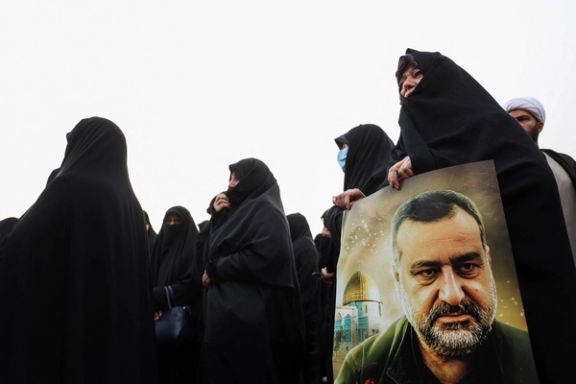
After Iran International exposed the inner circle of Iran’s top military man in Syria, eliminated by Israel this week, it is believed they will be Israel's next potential targets.
Israeli network i24 News reported on Sunday that following the killing of senior Iranian Revolutionary Guard general Razi Mousavi in an Israeli airstrike, his close aides may be next on Israel's hit list. The report by the Israeli website, which cited Iran International as the source of the information, was picked up by Iranian state media as “the four IRGC-Quds Force members on Israel’s kill list.”
Iran International’s Mojtaba Pourmohsen has exclusively reported on Iran’s network of arms smuggling into Syria via passenger planes and then to Lebanon and has identified several key members of the team. The operation was overseen by Razi Mousavi, prompting speculations that his deputies are going to run the operation after his death.
Abdollah Ebadi is Mousavi’s deputy who transfers weapons from Iran to Syria via commercial flights. His right hand, identified as Zein Shams Abu Adnan, is a key figure of the so-called ‘Relief Office’ of the operation – apparently a cover name for IRGC-Quds Force Unit 2250. Masoud Katbi is another deputy who used to head the transfers division and has been recently replaced by Hadi Feizabadi.
Unit 2250 is tasked with delivering all the cargo intended for Tehran's proxy forces in the port of Latakia, a target of repeated Israeli attacks. In December 2021, Israel hit containers of Iranian munitions being unloaded at the port.
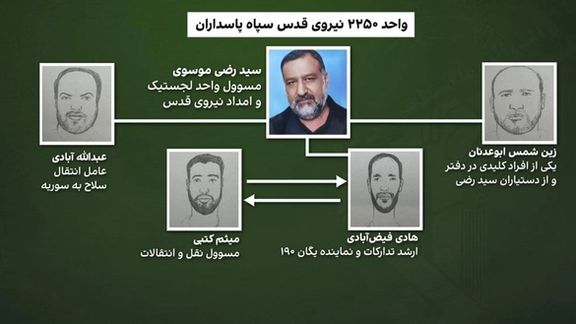
Israel has not officially claimed responsibility for the targeted killing, but it has always insisted that it seeks to prevent entrenchment of Iran-backed forces near its borders. It has been mounting attacks in Syria for years against Iranian and Iran-backed forces that have deployed there presumably to support Syrian President Bashar al-Assad.
However, Israeli Prime Minister Benjamin Netanyahu said Saturday that Israel “acts against Iran all the time, everywhere, in every way,” adding that Israel is “landing heavy blows against Hezbollah, eliminating many terrorists and destroying the enemy’s capabilities.”
“If Hezbollah expands the war, it will receive blows it never dreamed of – and so will Iran... Iran leads the axis of evil and aggression against us on the various fronts,” he stated.
In recent years, Israel has intensified strikes on Syrian airports to disrupt Tehran's increasing use of aerial supply lines to deliver arms to allies in Syria and Lebanon including Hezbollah. Following increasing disruptions to ground transfers, Tehran has adopted air transport as a more reliable means of ferrying military equipment to its proxy militias.
Since October 7, when Iran-backed Islamist group Hamas declared war on Israel, Tehran’s proxies have intensified attacks on US and Israeli targets across the region to pressure Israel into ceasing its retaliatory offensive in Gaza. Iran denies involvement in the October 7 attack but cheers Hamas killings and pledges unwavering support to any group that acts against Israel and US forces.
The death of Razi Mousavi on December 25 is seen as a blow to the Iranian regime’s ability to strengthen and supply its proxy forces in the region. Iran has vowed revenge for the targeted killing, similar to a US air strike that killed Iran’s Quds Force commander Qasem Soleimani in January 2020 in Baghdad.
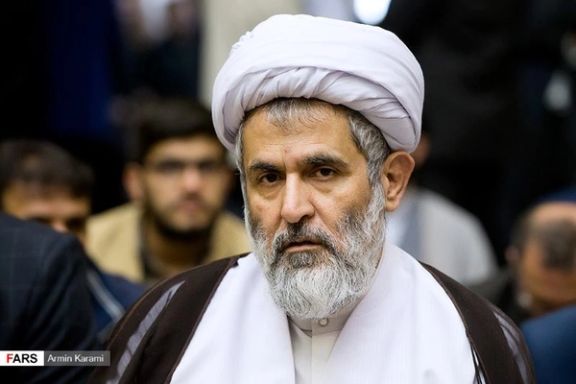
A former IRGC official claims that Razi Mousavi, who was recently killed in Syria, played a key role in direct confrontations with Israel.
Hossein Taeb, former head of the Islamic Revolutionary Guard Corps' (IRGC) Intelligence Organization, asserted on Sunday that Mousavi's death will intensify the resolve of the resistance movement against Israel.
Mousavi, reportedly targeted in an Israeli airstrike, is praised by the Iranian regime for his efforts in strengthening Iran's proxy forces of the "Axis of Resistance" in the region. The loss is deemed a setback for Iran, particularly in the context of the ongoing conflict between Israel and Hamas.
The advisor to the commander-in-chief of the Revolutionary Guards also vowed that such actions would not go unanswered.
In the midst of the ongoing Gaza war initiated by Hamas on October 7 against Israel, Iran-backed militias from Syria, Iraq, Yemen, and Lebanon have entered the conflict. Additionally, reports suggest that 11 senior officers of Iran's Revolutionary Guards fell victim to an Israeli airstrike on Damascus airport on Thursday.
Israel, traditionally reserved in commenting on such military operations, reiterates its commitment to preventing Iran's military entrenchment in Syria. Since 2017, Israel has consistently targeted Syrian locations to thwart Iran's attempts to bolster its military footprint and pose a threat to its northern borders. Notably, Syrian airports, allegedly facilitating the transportation of weapons to proxy forces by Iran, have become frequent targets.
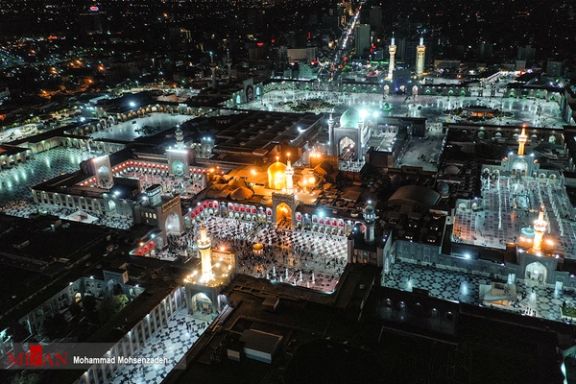
A municipal worker in the religious city of Mashhad resorted to self-immolation within the premises of an administrative building after facing unemployment.
ILNA news agency has identified him as Haji Ghadir Arab Teimouri, a 42-year-old worker employed by Mashhad Municipality.
The incident unfolded on Thursday, when Arab Teimouri, with a commendable 19-year employment history in the regulatory affairs of the Parks Organization, committed an act of self-immolation.
According to ILNA, the worker found himself unemployed under circumstances described as "uncertain reasons," leading to his suspension.
As of the latest update, Arab Teimouri is undergoing treatment at a hospital, where he is reported to have sustained 35% burns. His condition is labeled as "dangerous" due to physical complications and underlying health issues.
This incident sheds light on a growing concern for workers' suicide. Notably, two contract workers of the Chovar Petrochemical Company in Ilam, resorted to self-immolation on December 21 following the announcement of a mass layoff of workers within the petrochemical plant.
The primary factors contributing to the alarming trend of worker suicides in Iran are reported to be challenging living conditions and the impact of widespread job layoffs. Within a span of less than two years, six workers within the Chovar Petrochemical Company alone have taken their own lives in response to the distressing circumstances of layoffs.
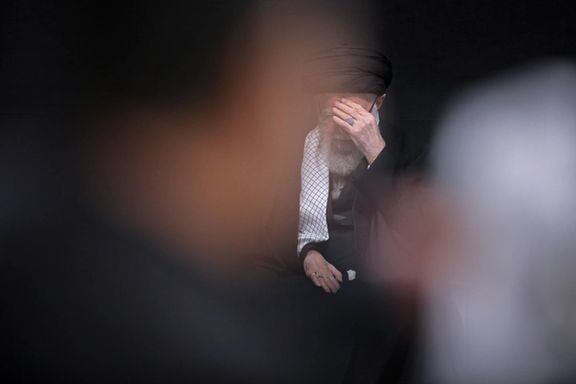
At the end of 2023, former high-ranking Israeli and American officials warned of the consequences of not countering Iran's escalatory tactics in two Op-Eds.
Naftali Bennett, former Israeli Prime Minister, and John Bolton, former US National Security Advisor and veteran diplomat, have both called for closer cooperation between US and Israel, and military strikes at the heart the Islamic Republic of Iran’s military-industrial complex on Iranian soil.
Bennett and Bolton serve a warning to the world, particularly the current Biden administration, that Iran’s expanding nuclear program and the armed proxies of Iran’s Shia Imperium to destabilize the region. They argue that it is imperative for both the US and Israel to take direct military action against Iran. They emphasize that it is high time for US and Israel to destroy Iran’s Shia Imperium’s arsenal manufacturing infrastructure as well as any other infrastructure that help sustain their escalatory attacks against Israel, the US forces in the region, and the commercial maritime navigation.
Such a call for action is not the screaming of two traditional stalwarts of military action against Iran in a vacuum. Iran-backed militias’ attacks on US bases over the past ten weeks have escalated to such a degree that President Joe Biden had no choice but to order back-to-back “measured” retaliatory strikes against these armed proxies, first on 27 October. Nonetheless, even within Biden’s administration many believe that the President’s response has been less than adequate. In fact, credible reports do indicate that Pentagon top brass are frustrated with Biden’s failure to retaliate against the Iranian backed militia with vehemence and strength.

Biden’s “Strategic Patience” towards Iran
Since January 2021, Biden’s administration has pursued a policy of strategic patience towards the Tehran regime. Strategic patience is all too familiar a device of national security to Biden, his national security advisor, Jake Sullivan, and his CIA chief, William Burns. Under Barack Obama, they all served an administration that did particularly adhere to “strategic patience” vis-à-vis North Korea and made a point that Obama’s “strategic patience” was totally different from that of President Richard Nixon’s during the last phase of the Vietnam War. Yet, the Syrian civil war and the rise of ISIS in Iraq and the Levant as well as the Taliban’s successful resurgence under President Obama proved to be catastrophic.
Biden’s “strategic patience” is pentagon shape in dimensions. First, it has sought to disengage from the Middle East, i.e., withdraw troops and installations to the minimum possible, and respond to proxy attacks on the remaining US forces “proportionally”. Second, it has attempted at striking formal or informal agreements with rogue (state and non-state) actors to contain them, such as negotiations with Iran for an informal agreement over its nuclear program. Third, it seeks to incentivize regional allies to pursue a similar policy with the said actors. Fourth, it intends to closely tie regional US allies through security arrangements for self-preservation against rogue (state and non-state actors); and fifth, actively disregard failed attacks or provocative bravados by rouge state and non-state actors against US forces in the region. The aforementioned dimensions have been addressed under “Support De-Escalation and Integration in the Middle East” per “National Security Doctrine (October 2022, 42-43) in broad terms. However, the administration’s practice of “strategic patience” has achieved neither the terrorism prevention objective, nor has it attained by any degree the goals of “greater stability, prosperity, and opportunity for the people of the Middle East”.
The follies of Biden’s strategic patience towards the Iranian Shia Imperium only become abundantly clear when it is stacked against the staggering number of 151 attacks launched by Iran’s Shia Imperium against US installations in Iraq and Syria between January 2021 and 17 November 2023. Since Hamas’ attack of October 7, there have been more than 100 attacks by Iran backed proxies on US bases in Iraq and Syria. In return, the US retaliatory response does hardly amount to half a dozen strikes against the Iran-backed proxies.
Biden’s recent retaliation against Iran-backed proxies pales totally when compared with “the alleged Israeli targeted master stroke” that eliminated IRGC General Razi Mousavi in Syria on December 25. As to Mousavi’s value as a target one shall suffice to note that he was a right hand man to Qasem Soleimani, the IRGC top general and a mastermind of paramilitary and asymmetrical warfare, dispatched by the Trump administration in a drone attack in January 2020.
In fact, Biden’s response has been interpreted as a woefully inadequate gesture when viewed against the hundreds of brazen attacks launched against US troops over the past two years. Moreover, Iran’s proxies might have very well viewed Biden’s response as a feeble one when compared with another “alleged” December 29 Israeli airstrike that dispatched 11 senior IRGC commanders near Damascus International Airport. Whilst one may never know the type of intelligence that led Israel to such targeted attacks of such highly valuable Iranian assets, one can fairly speculate that the eliminated individuals did advise the same armed groups that have attacked US forces in Syria and Iraq since 7 October, not to mention Hamas, over the past few years. It is true that Trump administration’s killing of Soleimani did not stop Iran’s proxies from attacking US installations in the region, but it is also a fact that the Iran Shia Imperium has struck US forces with far more frequency under Biden than it ever did under Trump.
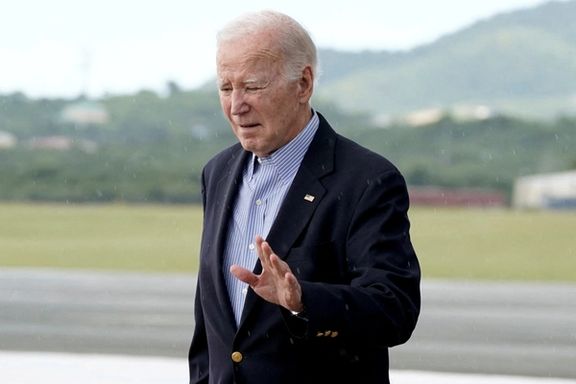
Iran’s Shia Imperium: The Matrix of Taking Advantage of Biden’s Strategic Patience
Iran-based analysts have been keenly following Biden’s staunch adherence to “strategic patience.” In fact, they have been developing different models to anticipate US reactions towards Iran’s provocations from early 2021. These models, found in the form of matrices published in Iranian “academic journals,” are significant as some have been penned by IRGC’s Imam Hossein military university graduates. All the said analysts have close connections to Iran’s foreign policy and national security decision making centers. On aggregate, these analyses place the pentagonal dimensions of Biden’s “strategic patience” at the core of their projections and seek to predict the trajectory of US-Iran “relations” until January 2025. Though almost all the said studies were published between 2021 and 2022, their proposed matrices do at once count on Biden administration’s commitment to “tension de-escalation with Iran” (strategic patience), its determination to arrive at some informal agreement over Iran’s nuclear program, and its focus to contain China.
Interestingly, they all believe, in so many words of course, that Iran Shia Imperium can prove itself useful to China and Russia by distracting US and its allies from theatres such as Ukraine and the South China Sea where Russia and China find themselves the target of increased pressure from the US and its allies. The papers are certainly “ambiguous” as to how this service can be rendered but it is hard to imagine absent of military skirmishes by Iran’s armed proxies any such distraction could have been given material effect.
The Biden administration seems to have read the wrong tea leaves when it developed its national security doctrine. The Tehran regime has now achieved the highest “weaponizable” capacity in its nuclear enrichment program, with an arsenal of long range ballistic missiles and an appetite to develop warheads. The Tehran regime may have been very much undermined through the trifecta of domestic instability, collapsed economy, and US-Western sanctions, but it has resolutely dragged itself through all these troubles by seamless fusion of systematic repression at home, and supplying cheap oil to China. In effect, Khamenei’s regime is not exactly on its knees yet.
The recent “alleged” Israeli elimination of key IRGC commanders in the region is testimony to Israel’s belief that Iran Shia Imperium has done its utmost to take advantage of Biden’s “strategic patience”.
Despite Hamas’ protestations that it planned and implemented 7 October attacks on its own, the question of Khamenei and his IRGC top brass foreknowledge of Hamas attacks is practically irrelevant. First, the Iranian regime has been a major military patron of Hamas. Second, for all intents and purposes, Iran Shia Imperium has proven a worthy ally of China and Russia in distracting the Biden’s administration. The US has now built up a behemoth military presence in the region by the advent of Israel-Hamas War. To deploy an attack nuclear submarine, an assault air squadron and two nuclear aircraft carriers with their accompanying battle groups into the Eastern Mediterranean and the Persian Gulf regions, in addition to all other bases in Qatar and Bahrain, is no small feat. With no concrete action against the Iranian military-industrial complex, as counselled by Bolton and Bennett, such a deployment shall only reassure Khamenei and his IRGC top brass that America is all bark and no bite. They may indeed make good on their promise of revenging General Mousavi’s elimination in the new year, an act that will certainly raise the stakes to escalatory heights in the region.
In this ever-unfolding game of chicken between US and Israel, on the one hand, and Iran and its armed proxies, on the other hand, the question is who will blink first when the stakes truly rise. Lest we also forget Prime Minister Netanyahu’s promise that whenever Israel decides that the stakes are sufficiently high enough, it may very well turn its attention away from a debilitated Hamas to the ever present and clear threat of the most powerful arm of Iran’s Shia Imperium in the region: the Hezbollah of Lebanon.